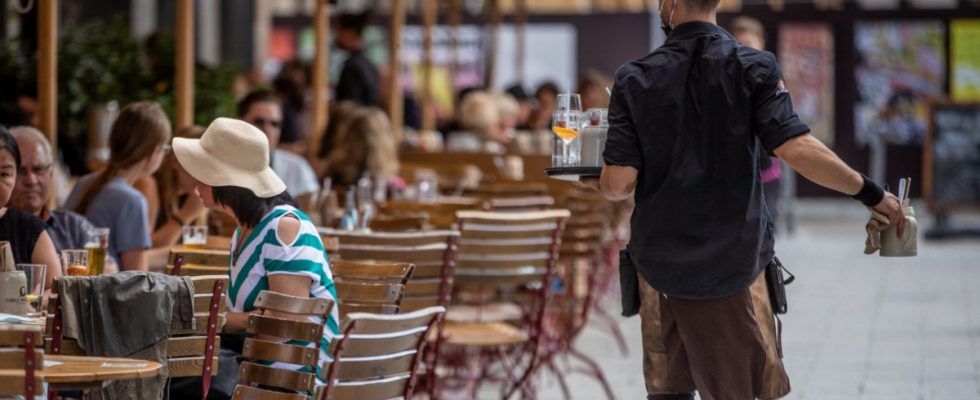High inflation and a lack of consumer confidence among Germans are still having a noticeable impact on hotels and restaurants. Price-adjusted (real) sales in the hospitality industry in the first half of the year were 10.4 percent below the pre-corona level of 2019, as the Federal Statistical Office announced on Thursday. In comparison, nominal revenues rose by 9.6 percent in the first half of 2019. “The difference between the nominal and real results reflects the price level in the hospitality industry, which has increased significantly over the long term,” explains the Federal Statistical Office. This would have contributed to rising prices for food, staff and energy.
The German Hotel and Restaurant Association (Dehoga) said the industry was heading for the fourth year of losses in a row. “The situation remains extremely challenging,” said Dehoga President Guido Zöllick. Compared to 2022, the balance sheet looks a little better. From January to June, companies had 15.8 percent more in their tills within a year. Adjusted for the rising prices, there was an increase in sales of 5.8 percent. The war in Ukraine has fueled global inflation and higher prices for energy, commodities and food. This slows down the business of hotels and restaurants.
The latest data from the statistical office show that in July 2023 alone, restaurant and accommodation services cost a good 20 percent more than in 2020. The price increase in terms of gastronomy alone was almost 23 percent compared to July 2019 – and thus to the level before Corona -Crisis.
Gastronomy is hoping for further tax breaks from 2024
In the catering industry alone, there was a real drop in sales of 12.0 percent in the first half of the year compared to the pre-crisis level in 2019, but in nominal terms there was a strong increase of 10.1 percent – which in turn signals sharply increased prices. Dehoga is constantly demanding the reduced VAT rate for food in the catering trade, which the government reduced from 19 to seven percent by the end of 2023 during the crisis. “An increase in sales tax on food at the turn of the year would have fatal consequences,” Zöllick warned. For decades, the association has been demanding that food be taxed uniformly at the reduced rate. “It would be contradictory and distortive to tax freshly prepared food in our restaurants at 19 percent from January 1, 2024, while 7 percent is levied on take-out, supermarket or food delivery.”
According to a Dehoga survey in July, if the tax relief were to expire, another 12,000 companies would have to close, Zöllick warned. “If our restaurants and cafés die, the cities and rural areas lose a lot of their attractiveness.” According to sales tax statistics, the hospitality industry lost a total of 36,000 companies in the pandemic years 2020 and 2021. In the hotel industry, sales in the first half of the year were 12.8 percent above the pre-corona level of 2019, but four percent below when adjusted for inflation. Many consumers are tightening their belts because of the loss of purchasing power as a result of high inflation. The inflation rate in Germany is currently 6.2 percent. Economists assume that it will fall towards three percent by the end of the year.

